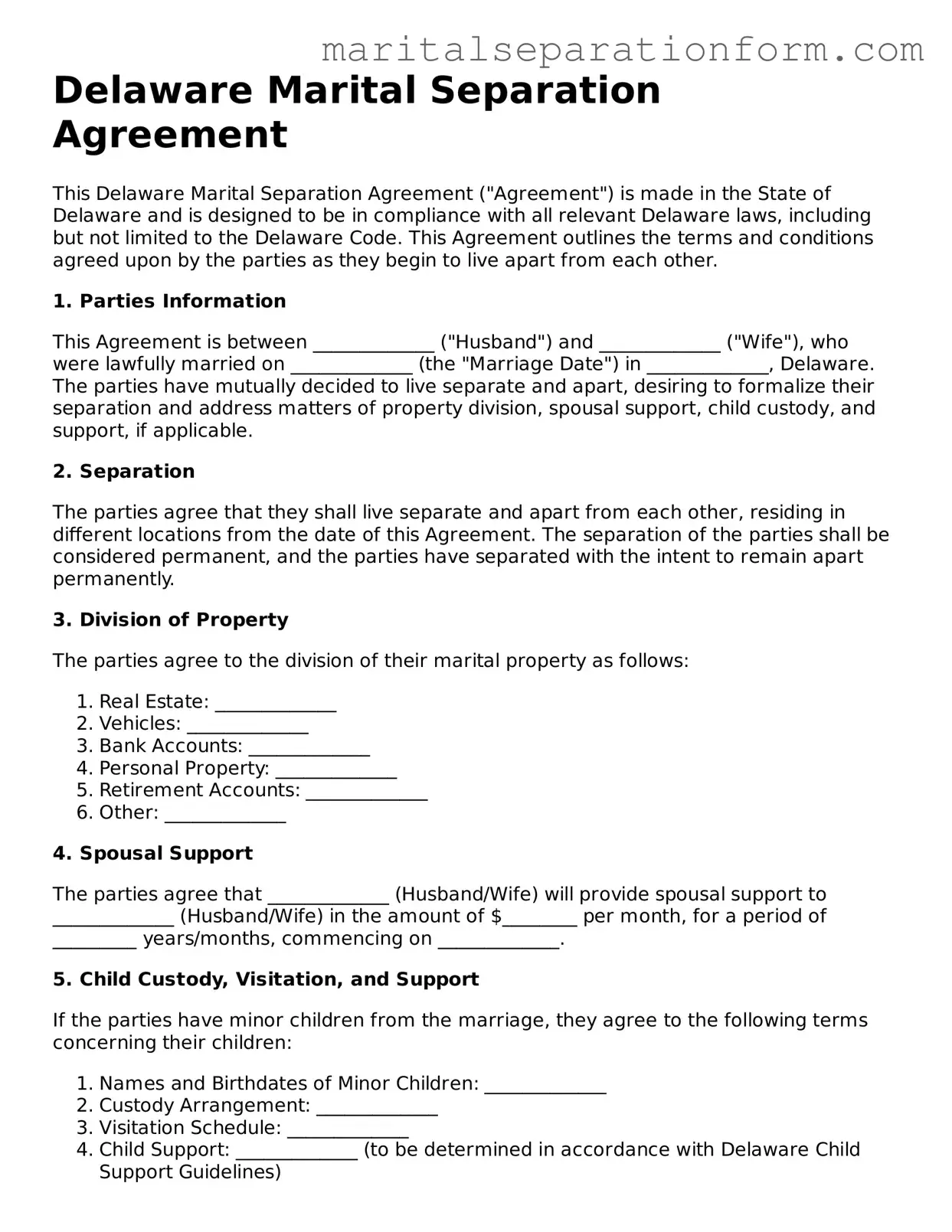What is a Delaware Marital Separation Agreement?
A Marital Separation Agreement in Delaware is a legal document created between married partners who intend to live separately but remain legally married. It outlines the arrangement on vital issues such as division of property, child custody, and spousal support, ensuring a clear mutual understanding and potentially avoiding future disputes.
Why is a Marital Separation Agreement important?
This agreement is crucial for ensuring that both parties understand their rights and obligations during the separation period. It helps in avoiding misunderstandings and conflicts by clearly defining terms related to financial responsibilities, asset division, and parenting plans among other matters. This clarity can save time and legal expenses should the separation lead to divorce.
Does a Marital Separation Agreement need to be filed with a court in Delaware?
While it's not mandatory to file a Marital Separation Agreement with a court in Delaware, doing so can be beneficial. Filing can make the agreement enforceable as a court order, giving it more legal weight and the ability to be upheld by the court if disputes arise.
Can a Marital Separation Agreement in Delaware cover child custody and support arrangements?
Yes, a Marital Separation Agreement can and often does include stipulations regarding child custody, visitation schedules, and child support arrangements. The primary focus is always on the best interests of the child, and the agreement should reflect arrangements that support their well-being.
Is a lawyer required to create a Marital Separation Agreement in Delaware?
While it's not legally required to have a lawyer draft a Marital Separation Agreement, consulting one is highly advisable. A lawyer can ensure that the agreement is fair, comprehensive, and complies with Delaware law, which can prevent possible legal pitfalls down the road.
What if we cannot agree on the terms of the Marital Separation Agreement?
If spouses cannot agree on the terms, mediation might be a valuable step before pursuing litigation. Mediation involves a neutral third party who can help negotiate and reach a mutually satisfactory agreement. If mediation fails, the dispute may need to be resolved in court.
Can a Marital Separation Agreement be changed after it is signed?
Yes, but changes to the agreement must be made formally and ideally with legal counsel. Both parties must agree to any amendments, which should then be documented in writing and signed, to avoid future disputes or confusion.
How does a Marital Separation Agreement affect the divorce process?
Having a Marital Separation Agreement can significantly streamline the divorce process, as it already addresses and potentially resolves many of the disputes concerning assets, custody, and support. When the time comes, the agreement can be incorporated into the final divorce decree, making the divorce process faster and less contentious.
Are assets acquired after signing the Marital Separation Agreement considered separate property?
Generally, yes. Assets acquired by either spouse after the execution of a Marital Separation Agreement are typically considered separate property and not subject to division in the event of a divorce. However, the agreement should clearly state how future assets will be handled to avoid any ambiguity.
What happens if one spouse violates the Marital Separation Agreement in Delaware?
If one spouse violates the agreement, the other may file a motion with the court to enforce the agreement. The court can then take necessary actions to ensure compliance, which may include ordering payment of fines or modifying the original terms of the agreement based on the situation.

